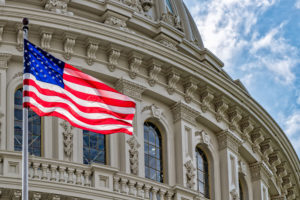
FDA approves a pill that tracks when patients take their medication, CFPB director will resign, and more…
IN THE NEWS
- The U.S. Food and Drug Administration (FDA) approved Abilify MyCite, a pill with an ingestible sensor that tracks whether patients have taken their medication. FDA authorized this product for the treatment of schizophrenia and bipolar I disorder and as part of a treatment regimen for depression.
- Richard Cordray, director of the Consumer Financial Protection Bureau (CFPB), announced his intent to resign from the agency by the end of November. U.S. Senator Elizabeth Warren (D-Mass.) said that Cordray is “a dedicated public servant and a tireless watchdog for American consumers – and he will be missed.” U.S. Representative Jeb Hensarling (R-Texas) said, “We are long overdue for new leadership at the CFPB, a rogue agency that has done more to hurt consumers than help them.”
- President Donald Trump announced that he will nominate Alex Azar to be secretary of the U.S. Department of Health and Human Services (HHS). Azar served as general counsel and deputy secretary at HHS during the George W. Bush Administration and has worked for the drug company Eli Lilly. President Trump said Azar would be a “star for better healthcare,” but U.S. Senator Ron Wyden (D-Ore.) promised to scrutinize Azar’s “commitment to faithfully implement the Affordable Care Act.”
- The U.S. Fish and Wildlife Service (FWS) will reportedly allow hunters to bring back to the United States elephants hunted in Zimbabwe and Zambia. FWS’s move undoes the Obama Administration’s 2014 ban on imports of hunted elephants, which FWS prolonged indefinitely in 2015. Paul Babaz, President of Safari Club International, praised the FWS for acknowledging “that hunting is beneficial to wildlife” and for breaking down “barriers to sustainable use conservation for African wildlife.” Wayne Pacelle, President and CEO of the Humane Society of the United States, condemned FWS’s decision, noting in particular the decline of the elephant population and Zimbabwe’s dissatisfactory oversight of the elephant population.
- The U.S. Senate Committee on Finance added to its version of the Tax Cuts and Jobs Act a provision that would “effectively repeal the individual mandate tax” in the Affordable Care Act. The Committee said that the mandate harms low-income Americans, “hasn’t worked,” and “is unpopular.” Senate Finance Committee Ranking Member Ron Wyden (D-Ore.) tweeted his displeasure with the decision, saying that the bill exchanges “Americans’ health care for corporate handouts.”
- The U.S. Senate confirmed Joseph Otting to serve as U.S. Comptroller of the Currency. Otting replaces Keith Noreika, who had served as Acting Comptroller since May. Prior to his nomination as Comptroller, Otting had worked for a number of banks, including serving as chief executive officer of OneWest Bank, a California-based bank founded by U.S. Secretary of the Treasury Steven Mnuchin.
- The U.S. Department of Transportation issued a final rule that will require opioid testing for pilots, air traffic controllers, and railroad engineers. Transportation Secretary Elaine Chao explained the need for the final rule: “The ability to test for a broader range of opioids will advance transportation safety significantly and provide deterrence to opioid abuse, which will better protect the public and ultimately save lives.”
- The U.S. District Court for the Eastern District of Pennsylvania blocked the U.S. Department of Justice (DOJ) from denying Philadelphia a federal grant for the city’s “criminal justice needs.” The court said that Philadelphia meets the DOJ’s immigration enforcement requirements needed to receive the funds and suggested that the DOJ’s requirements are unconstitutional. The court blocked the DOJ from refusing to give Philadelphia the grant because, without the money, “irreparable harm” would result to Philadelphia: for example, the city uses some of the money to combat the opioid epidemic.
- Monsanto, Inc. along with several agricultural industry groups sued the California Office of Environmental Health Hazard Assessment for listing the herbicide glyphosate as a carcinogen—a substance known to cause cancer—following a 2015 International Agency for Research on Cancer (IARC) report listing glyphosate as probably carcinogenic. A Monsanto executive reportedly said that glyphosate is safe and this “labeling requirement would do nothing more than compel false warnings about a safe product.” The State of California argued that a listing “is automatically required even if IARC is absolutely alone in its views.”
- FDA provided a draft guidance for implementation of its menu nutrition labeling requirements. The draft guidance includes “expanded and new interpretations of policy, and identifies places where FDA intends to be more flexible in its approach.” The comment period for the draft guidance ends January 8, 2018.
WHAT WE’RE READING THIS WEEK
- In an article for Vanderbilt Law Review, Eric Biber of the University of California, Berkeley School of Law argued that the sharing economy has created policy disruption—a disjunction between the regulatory scheme and the industry being regulated. The authors proposed that legislators “draft laws more neutrally” to attempt to avoid policy disruptions.
- In an article for the Brookings Institute, Connor Raso, counsel at the U.S. Securities and Exchange Commission, discussed what deregulation looks like under the Trump Administration. Raso found that deregulation includes “reducing restrictions on conduct”; “removing outdated, inconsistent, or otherwise unnecessary rules”; “eliminating disfavored regulatory impacts”; and “increasing competition in a regulated market.”
- In an article for The New York Times, Ben Protess and Jessica Silver-Greenberg observed the Office of the Comptroller of the Currency’s emerging status as “a vital player in the Trump Administration’s campaign to roll back regulations” on the banking industry, particularly through acts by former Acting Comptroller Keith A. Noreika, who has strong banking industry ties. Protess and Silver-Greenberg noted that, under the Trump Administration, the Comptroller’s Office has loosened loan regulations and has made it easier for banks to enter into mergers.



